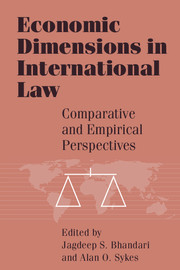Book contents
- Frontmatter
- Contents
- Preface
- Introduction: Economics and international law
- 1 The economics of the most favored nation clause
- 2 The economics of “injury” in antidumping and countervailing duty cases
- 3 The economics of “injury” in antidumping and countervailing duty cases: A reply to Professor Sykes
- 4 Innovations in support of the unitary injury test in U.S. unfair trade cases
- 5 The free trade–fair trade debate: Trade, labor, and the environment
- 6 International conflict and coordination in environmental policies
- 7 Market modernization of law: Economic development through decentralized law
- 8 Toward a positive theory of privatization: Lessons from Soviet-type economies
- 9 New stories on exchange rate policies in transition
- 10 Is deposit insurance inevitable? – lessons from Argentina
- 11 The market for migrants
- 12 The interplay of liquidation and reorganization in the bankruptcy systems of Canada and the United States: The role of screens, gatekeepers, and guillotines
- 13 International political economy approaches to international institutions
- 14 The trade effects of domestic antitrust enforcement
- 15 The Hartford Insurance Company case: Antitrust in the global economy – welfare effects and sovereignty
- 16 Recognition of foreign judgments as a trade law issue: The economics of private international law
- 17 Externalities and extraterritoriality: The law and economics of prescriptive jurisdiction
- Index
14 - The trade effects of domestic antitrust enforcement
Published online by Cambridge University Press: 05 December 2011
- Frontmatter
- Contents
- Preface
- Introduction: Economics and international law
- 1 The economics of the most favored nation clause
- 2 The economics of “injury” in antidumping and countervailing duty cases
- 3 The economics of “injury” in antidumping and countervailing duty cases: A reply to Professor Sykes
- 4 Innovations in support of the unitary injury test in U.S. unfair trade cases
- 5 The free trade–fair trade debate: Trade, labor, and the environment
- 6 International conflict and coordination in environmental policies
- 7 Market modernization of law: Economic development through decentralized law
- 8 Toward a positive theory of privatization: Lessons from Soviet-type economies
- 9 New stories on exchange rate policies in transition
- 10 Is deposit insurance inevitable? – lessons from Argentina
- 11 The market for migrants
- 12 The interplay of liquidation and reorganization in the bankruptcy systems of Canada and the United States: The role of screens, gatekeepers, and guillotines
- 13 International political economy approaches to international institutions
- 14 The trade effects of domestic antitrust enforcement
- 15 The Hartford Insurance Company case: Antitrust in the global economy – welfare effects and sovereignty
- 16 Recognition of foreign judgments as a trade law issue: The economics of private international law
- 17 Externalities and extraterritoriality: The law and economics of prescriptive jurisdiction
- Index
Summary
As formal governmental barriers to free international trade have fallen, trade experts both inside and outside governments have devoted an ever increasing amount of attention to other measures that may also impede international trade. Indeed, this was the distinguishing characteristic of the recently completed Uruguay Round of multilateral negotiations under the auspices of the General Agreement on Tariffs and Trade (GATT 1947). Although tariff negotiations certainly took place, the real action was in the ambitious agenda to bring subsidies under control, to address the trade effects of intellectual property and investment measures, to bring the vast world of international trade in services under some rudimentary disciplines, and to address the GATT's institutional weaknesses once and for all. The World Trade Organization (WTO) and the GATT 1994 were the result of those often Herculean efforts. Today, as the WTO looks forward to beginning its work, it is only natural that its constituent states should assign a high priority both to the implementation of the new Uruguay Round agreements and to the development of the “next generation” agenda.
It is also hardly surprising that the “next generation” issues push even farther than the Uruguay Round into subject matters that once were considered purely within the internal jurisdiction of states. Not only in the field of international trade law, but more generally, international law scholars have begun to examine the extent to which the traditional domaine reserve of municipal law is either shrinking or at least coexisting with international norms.
- Type
- Chapter
- Information
- Economic Dimensions in International LawComparative and Empirical Perspectives, pp. 513 - 529Publisher: Cambridge University PressPrint publication year: 1998



